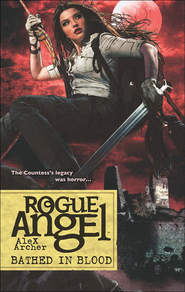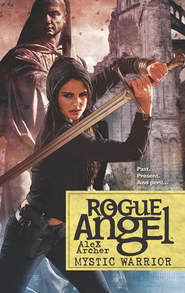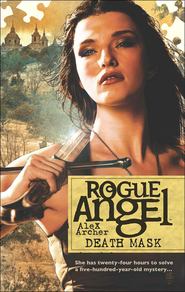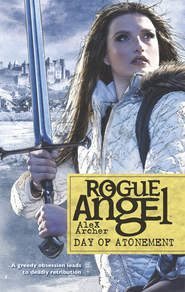По всем вопросам обращайтесь на: info@litportal.ru
(©) 2003-2025.
✖
God Of Thunder
Автор
Год написания книги
2019
Настройки чтения
Размер шрифта
Высота строк
Поля
Skagul, called Ironhand, led the way. He was the chieftain. A large man, well over six feet in height, he was massively muscled from a life spent working hardscrabble earth in his homeland for a harsh existence. His dirty blond beard, rimed with sea salt, hung down to his mid-chest. Tiny figurines carved of wood, stone and ivory hung in his beard and the long hair he wore pulled back in a ponytail.
The reindeer hide he’d added to his tunic to ward off blows and arrows was cracked with age but still supple and serviceable beneath the thick bearskin cloak. A metal helmet covered his head.
He carried a long-handled war ax in his right hand. His left hand was gone, replaced by a cruelly curved iron hook. Sixteen years earlier, he’d lost the hand in a battle with an opposing tribe. His father had been a blacksmith when he hadn’t gone raiding. Together, they’d fitted Skagul with the hook. He was short a hand, but he’d added an incredible weapon to his arsenal.
Senses tingling, Skagul trotted through the ice-cold ankle-deep tidewaters. The longship was nearly flat bottomed and could be sailed or rowed in only inches of water. In his years spent raiding, he’d taken his vessel across oceans, as well as upriver.
His heart beat quickly in his chest, warming him against the touch of early winter and the coming storm. The raiding season was almost over. It they didn’t take a prize soon, there would be little to show for their efforts when they returned home before winter settled.
Ahead of them, the village sat quiet and still, frosted by the light snow that had come during the night. Most of the houses were wooden one-room affairs much like the longhouses in Skagul’s village. Judging by the smoke from a few cook fires curling into the pink-hued sky, only a few people were up.
Goats bleated in small lean-tos behind many of the houses. Roosters crowed to greet the new day. A few dogs lounged in the lean-tos, as well, sharing space and warmth with the goats.
That suited Skagul and met with his expectations. The animals could be a problem, but men just crawling out of bed were often thickheaded and slow to react. He was gambling everything he had on this effort, wanting to go back to his people victoriously.
Victory meant wealth.
Behind them, the incoming tide lapped at the shore and birds cried overhead as they skirled through the sky. The dark clouds sailed the leaden sky with greater speed. The wind had picked up, buffeting the Norsemen as they hunkered down in the brush at the edge of the village.
Holding up his war ax, Skagul glanced over his shoulder.
There, in the rolling fog under the storm clouds, he spotted the dragon prow of his ship. Snarling and savage, the dragon looked fierce and hungry. Heavy red and white sails lay furled on the masts, ready at a moment’s notice. When raised, the mainsail displayed a snake, mouth open and fangs distended.
Skagul’s heart swelled with pride. Her name was Striking Serpent and she had earned her name many times over. She was a twenty-oar ship with sixty-three crewmen. There had been more, but twelve had died fighting the Finns and others had been lost along the way. Since Skagul had been chosen to command the vessel, he’d always been successful.
This, though, had been his hardest year. Only a few weeks earlier, a band of Finns had attacked them at camp and stolen away with all their goods. They’d lost everything they’d spent months stealing.
Skagul would not return home empty-handed with so many mouths to feed. Nor would he see his young crewmen return without bride-price.
“Archers,” Skagul growled.
Twenty warriors peeled away from the group. They nocked arrows to their longbows.
“There.” Skagul waved toward the forested low hills ringing the north side of the village. The land and the trees provided a windbreak against the freezing north winds, which was probably why the village had been built there.
The warriors went at once. They were mostly silent, but Skagul heard some of their gear ring and bang as they took up positions along the hills.
No one in the village noticed.
Standing, Skagul hefted his war ax. The storm winds pulled at his beard and hair. He ignored the cold and moved forward. If things went well, the villagers would take one look at them and surrender everything they had.
The dogs started barking, then ran out to challenge the invaders. Their sharp teeth flashed and snapped. The Norsemen growled.
Skagul swung his ax, cleaving the skull of one dog and killing it instantly. Other warriors killed more of them, and they left the furry corpses behind them.
The goats bleated and chickens ran for cover.
Something was wrong. The feeling coiled and twisted through Skagul’s belly like his ship’s namesake. He held up his ax, calling his warriors to a halt.
The Norsemen stopped, forming a ragged line.
No one peered from the windows of the huts or came to the doors.
Skagul pointed at his men. “You three. Check the homes.”
Immediately the warriors ran to the nearest hut. They broke down the door with their axes. The sharp crack of splintering wood cut through the whirling air. One of them went inside and returned almost immediately.
“No one’s inside,” the warrior announced.
“Check them all,” Skagul ordered. As the men went to do so, he strode angrily to the center of the village. He cursed violently, knowing that the spying they’d done the night before hadn’t gone unnoticed.
“Norseman!” a voice rang out.
Spinning, lifting his war ax, Skagul peered to the east and spotted a man standing almost hidden among the branches of a tall spruce tree. He wore reindeer hide in much the same fashion as the Norsemen but stood empty-handed. His skin was too light to be one of the Curonians, but Skagul knew they were in Courland. The man’s beard was fiery red.
“I am Skagul,” the Norseman roared.
“I’ve heard of you, Ironhand.”
Skagul waited but the other man didn’t introduce himself. “Who are you?” Skagul demanded to know.
“Your death if it comes to that.”
Fury possessed Skagul. For two weeks the frustration he’d felt at the loss of his cargo to the Finns had festered inside him. To be addressed like this, in front of his warriors, was intolerable.
“Brave words from a man hiding in a tree,” Skagul scoffed.
The stranger smiled, calmly and confidently. “I didn’t have to show myself to you at all. I could have put an arrow through your eye.” He paused. “Go to the well and draw the bucket. We’ve left tribute for you. For all your hard work to take what little other people have struggled to gain.” His tone at the end was mocking.
Skagul walked over to the well. He nodded to one of his warriors. The bucket was quickly drawn. He’d expected a trick, but the bucket was filled to the brim with chunks of amber.
The material was valuable and could be used in trade in the Arab lands, as well as with the Franks, Saxons and Celts. Fishermen along the coasts of the North and Baltic Seas dredged amber from the seafloor. Skagul didn’t know why the amber was only found there, but knew its rarity made it more valuable.
“That bucket contains a fortune,” the man in the tree declared. “You’re not welcome to it, but it’s yours for the taking. Accept it and walk away. That way neither side has to lose a life today.”
Skagul gestured. His warrior poured the contents of the bucket into a bag.
“You have more than this,” Skagul told the man in the tree.
“Not for you to take,” the man replied. “I won’t let you strip these people of everything.”
These people. The word choice hung in Skagul’s brain. “You’re not a Curonian.” The more he looked at the man, the more he thought that the man was a Norseman.
“I’m not,” the man agreed. “I was born not far from where you were, but I’m raising my children here. My home is here.”
Skagul nodded and raised his war ax. “As a fellow countryman, I’ll stand you to a proper funeral, then.”
The man in the tree grinned grimly. “Then I’ll extend you the same offer.”











